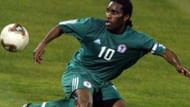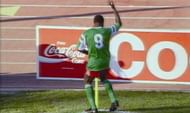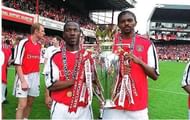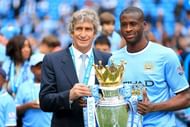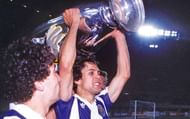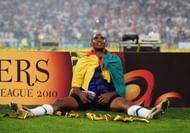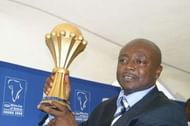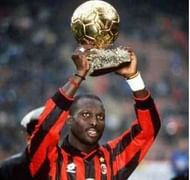The African continent has produced some of the finest players in history, with plenty of its top players going on to become unshakable legends of the game. Many of them came from truly modest surroundings before going on to take over the game at its highest level. Despite the continent having never brought home the FIFA World Cup, they have forged unforgettable memories both on the international and the club stage. At several top European clubs, these men have forged legends that will go down forever; names that will never be forgotten thousands of miles away from their birthplaces. Overcoming a million obstacles from poverty and suffering to racism and xenophobia, these men have shown the entire world the power that football has to change lives. Many of them have gone on to become giants in their nations, using their influence to save people’s lives, promote equality and give future stars a chance to thrive. So let’s hurry up and count down the top 10 African football players to take their skills to the pinnacles of European football!
10. Kolo Toure
Kolo Abib Toure is one of the greatest Ivorian footballers ever, born on the 19th March 1981 in Bouake, Ivory Coast. He began his career at ASEC Mimosas (winning 2 league titles) before moving to Arsenal in 2002 for £150,000 after a short trial. There, he only made his first-team debut in the following season in a Community Shield victory against future club Liverpool. His first goal for the Gunners was in a 1-1 draw against Chelsea at Stamford Bridge. The following season, he made 37 appearances as Arsene Wenger’s side went the whole campaign unbeaten, making history in 2003/2004. By 2006, he was a stalwart of the Premier League, keeping 10 consecutive clean sheets as Arsenal reached their first and only UEFA Champions League final. 2 years later, he moved to Manchester City for £14 million, where he won the Premier League, the FA Cup & the Community Shield. After 4 successful years, he moved on to Liverpool, where he was part of that thrilling Brendan Rodgers side that scored over 100 goals but just fell short. In 2016, Liverpool announced the end of his contract.
He is the 2nd most capped Ivorian footballer in history with 118 caps, and has represented his nation at 3 World Cups and 7 Africa Cup of Nations, finally winning it in 2015 as he scored the winning penalty in the Equatorial Guinea on his final international appearance. He has scored 7 goals for his country and has been a major rock in their defence, his extensive experience being used in 3 of England’s biggest clubs.
9. Jay-Jay Okocha
Augustine Azuka Okocha, better known by his nickname Jay-Jay (inherited from his older brother James, who was also a footballer) is probably reknown for being one of the most fantastic African flair players. The Nigerian attacking midfielder was born in 1973, first playing football “with any round thing we could find”. His first team was Enugu Rangers, which he joined in 1990 before switching to 1.FC Saarbrücken in the German 2nd division. He only lasted months there before moving to the Bundesliga (top tier) at Eintracht Frankfurt in December one year later. There he impressed; especially against Karlsruhe where he scored the Goal of the Season on Oliver Kahn – his team broke on the counter before he received the ball. He didn’t just slot it in however, he did his usual tricks and flicks past 3 or 4 players before slotting it in with class. He also played with Ghana top striker Tony Yeboah in his time there, but after a falling out with then manager Jupp Heynckes they both wound up leaving the club. His next stop was Fenerbahce, signing for £1 million in 1996. There, he struck 30 goals in 62 matches – plenty of them free-kicks – and even became a Turkish citizen under the name “Muhammet Yavuz”. He triumphed in the Chancellor & Ataturk Cups in his final year there.
By 1998, French capital club Paris Saint-German splashed out £14 million to make him the most expensive African player at the time. He scored 12 goals in 84 matches, linking up with a certain dribbler from Brazil called Ronaldinho, winning the “Trophee Des Champions” and the UEFA Intertoto Cup in 2001. In 2002, he joined England’s Bolton Wanderers on a free, where he again scored a Goal of the Season against West Ham. He also won their 2005 Player of the Year. He spent a total of 4 years there, captaining them for 2 years before his move to Qatar SC. He scored 6 goals in 41 games there before returning to help Hull City gain promotion to the Premier League for the first time in 100 years with 18 matches in 2008, before his retirement at the end of the season.
His debut for Nigeria came against the Ivory Coast as a 20yr-old, but it was his second game that made him a hit – he scored a direct free-kick to take Algeria from 0-1 to a 4-1 win against Algeria. In 1994, he won the Africa Cup of Nations and lost to runners-up Italy in the round of 16. In 1995, he won the (now-defunct) Afro-Asian Cup of Nations. 1 year later, he was part of the Nigerian ‘Dream Team’ which won gold at the 1996 Olympic Games in Atlanta. He won Nigerian Footballer of the year 7 times, as well as the first 2 BBC African Footballer of the Year Awards – all of this in just 73 matches, with 14 goals. His legacy however, is much more than that – it’s as one of the greatest entertainers that football has ever seen. He brought the silkiest that African football has to the World Cup, to England, Turkey, Germany and Qatar.
8. Roger Milla
Albert Roger Mooh Miller was born on the 20th May 1952, starting his football at Eclair de Douala from 1965 to 1970. He got his first professional football at Leopards Douala, winning back-to-back Cameroon Premiere Division titles, scoring 89 goals in 116 games. He then moved to Tonerre Yaounde, where the striker hit amazing numbers again, scoring 69 goals in 87 matches. This led to him being named the 1976 African Footballer of the Year, a year after winning the African Cup Winners’ Cup. His incredible form could not be hidden any longer and French club Valenciennes came calling in 1977, but they kept him in the reserves for two years.
His next European switch was to Monaco in 1979, but injuries prevented him from getting a foothold in the team. He tried again in Bastia, but it was another unsuccessful spell that ended his run of just 43 goals (in 156 matches) in 7 years. He still won the Coupe De France for them in 1980 and 1981 with 35 goals in 113 games. Finally in 1984 he joined Saint-Etienne, smashing 31 goals in 59 games before he hit 37 in 95 for Montpellier. A spell in Saint-Pierroise preceded a move back home to Tonnerre Yaounde, where he rediscovered his best football, hitting 89 goals in 116 matches, before he wound his career down in Indonesia for Pelita Jaya (where he scored a goal a game) and Putra Samarinda (where he hit 18 goals in 12 matches).
Roger Milla’s international debut was against Zaire in 1973, aged 21. He participated in their 1982 World Cup run, which finished with 3 draws and a first-round exit. He was part of their more victorious side in 1984 as Cameroon took the Africa Cup of Nations before retiring from international football after his second triumph in 1988. He then moved to Reunion after emotional testimonials to spell an end to football – or so, he though.. In the year 1990 however, Cameroon again qualified for the FIFA World Cup and then president Paul Mbiya called him to convince him to rejoin the national squad. He agreed, and in 1990 (age 38) went to Italy with his countrymen for football’s biggest tournament. He scored a brace against Romania there, and then 2 more in extra-time against Colombia to take Cameroon into the quarter-finals. His famous Makossa dance celebration around the corner flag was made famous there. In their quarter-final draw against the English, he turned the match by winning a penalty for Kunde and assisting Ekeke to comeback from 1-0 down to 2-1. However, England won it with 2 extra-time penalties. He eventually won the African Footballer of the Year once again. 4 years later, he came back on to score against Russia, becoming the oldest FIFA World Cup goalscorer at 42. His international career finished with a terrific 37 goals in 63 caps, and a goal celebration that lives on to this day.
7. Nwankwo Kanu
Nwankwo Kanu was born on the 1st of August 1976, beginning his career at Federation Works. Then, he moved to Iwuanyanwu Nationale where he played for 11 years as a youngster, scoring 15 goals in 25 major appearances. In 1993, Dutch club Ajax snapped him up for just €207,000. The following year, he made his debut, striking 25 goals in 54 matches as he won it all in the game. 3 consecutive league titles, the UEFA Champions League, the Super Cup & the Intercontinental Cup. In 1996 he moved to Inter Milan for $4.7 million, but scans revealed a heart defect which meant he had to undergo surgery in November and could not return to Italy until April 1997. His incredible experience would eventually lead to him founding the Kanu Heart Foundation for African kids suffering from heart defects and homelessness. In 1999, Arsenal signed him for £4.15 million, but he caused an outrage by assisting an Overmars goal on his debut in a confusing fair play situation to win it 2-1. That led to a replay, which they again won – with Marc Overmars scoring again. Kanu’s biggest moment in Arsenal colours was a hat-trick in 15 minutes to take Arsenal from 2-0 down to a 3-2 win against bitter London rivals Chelsea. He won two league titles and two FA Cups there, including that famous unbeaten season. In 2004, he signed for West Bromwich Albion, scoring only 9 goals in 58 games. He left one year later to Portsmouth, becoming a crucial part of their famous 2008 FA Cup winning side. However, they slipped into administration and he was one of a number of players to be owed wages since 2006 – his were £3 million!
Kanu made a big impression in the 1993 U-17 World Cup that Nigeria won(which earned him the Ajax move). He was part of Nigeria’s 1996 Gold Medal winners in Atlanta, as well as the side that beat Uzbekistan in the Afro-Asian Cup of Nations. He is a two-time African Footballer of the Year, in 1996 & 1999, as well as a winner of the BBC African Footballer of the Year in 1997 and in 1999 as well. He was capped a total of 87 times for his country, scoring 12 international goals.
6.Yaya Toure
Gnegneri Yaya Toure was born on the 13th of May in 1983 where he played for ASEC Mimosas (winning a league title in 2001) like his older brother before moving to Beveren in Belgium at the age of 18. 2 years later, he also had a trial at Arsenal (where Kolo Toure was playing), but he struggled in a pre-season match ag ainst Barnet. Although Arsene Wenger saw the talent in him, his struggles with a work permit led to him moving to Metalurh Donetsk in Ukraine. He only spent one and a half years there before he moved to Greek side Olympiacos in 2005, where he began to establish himself with 32 appearances as they won a domestic double. AS Monaco came next, but they just struggled to stay up after a managerial change led to an upturn in form in the second half of the season. His part in their survival (with 5 goals) led to FC Barcelona’s £6.7 million in 2007. He was a part of that legendary side that won 6 trophies in 2008/2009, playing in the final as a centre-back – only his 3rd appearance in that position for Barcelona.
After 117 matches and 7 trophies, he moved to Manchester City for £24 million. There, he played alongside his older brother Kolo Toure on his way becoming one of the league’s most dominant midfielders. In 2011, he scored against Wigan to end a 35-year wait for a major trophy with a 1-0 win in the FA Cup final. He assisted Zabaleta’s first goal in that incredible 3-2 victory on the final day before coming off injured as they triumphed in the last seconds against QPR to win the Premier League after 44 years. In 2013/2014, he matched Frank Lampard’s 20-goal haul for a midfielder in a Premier League season as City won the Premier League title again. He was also made the club vice-captain, although he wore the armband numerous times. Despite nominally being a central midfielder, he’s racked up an impressive 72 goals in 263 games for Manchester City – especially at Wembley and in crucial big games.
For the Ivory Coast, he was called up at the age of 21. He’s played in 6 African Cup of Nations, finally clinching it alongside his brother in 2015 as the captain – after Didier Drogba’s retirement. He’s been in the team of the tournament 3 times, and won the African Footballer of the Year in from 2011 to 2014. He’s also been voted the BBC African Footballer of the Year twice, scoring 19 goals in 100 matches for his country.
5. Rabah Madjer
Mustapha Rabah Madjer was born on the 15th of December 1958 in Hussein Dey, Algeria. He scored 58 goals in 94 games for NA Hussein Dey in his 8 years there; winning the Algerian Cup in 1979. He then joined Racing Club de France Colombes 92, where he hit 23 goals in 50 games before being loaned out to Tours FC in 1985. That’s where Portuguese side FC Porto spotted him, signing him before the 1985/1986 season. He immediately proved his worth, scoring 29 goals for them in 50 matches. He was a key component of their historic 2-1 European Cup victory over Bayern Munich, scoring the equalizer before assisting Juary for the winner as they ran out 2-1 winners. He started the next campaign in incredible form, hitting 10 goals in 11 games before Valencia & La Liga beckoned. There he hit 4 goals in 4 matches, eventually resigning for Porto where he spent another 3 years, scoring 21 goals in 50 games! They enjoyed a golden period with Madjer on their side, winning 3 league titles, 1 European Cup, 1 Intercontinental Cup, 2 Portugese Cups and 2 Candido de Oliveira Trophies. In 1987-88, he finished as the top scorer in the European Cup. His last team was Qatar SC, where he scored 6 goals in his 9 final professional matches.
Madjer’s international career lasted 19 years, during which he led Algeria to the 1982 and 1986 World Cups. He won the 1990 African Cup of Nations in Nigeria and the Afro-Asian Cup of Nations in 1991. He also took the All-Africa Games gold medal in 1978, as well as the Pan-Arab Games of 1985. He was named the 1987 African Footballer of the Year as well, and has gone on to coach his national team twice.
4. Didier Drogba
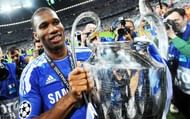
Didier Yves Drogba Tebily was born on the 11th of March 1978 in Abidjan, Ivory Coast. His early years were spent at his uncle’s house in France (Michel Goba, also a pro footballer), where he played for 4 different youth teams without really establishing himself as a top prospect despite impressing in spurts. Finally aged 21, he joined the Le Mans senior side and scored 12 goals in 64 matches in a difficult spell. Even though, Guingamp saw his talent and signed him for £80,000. It proved to be a wise acquisition as he combined well with future Chelsea teammate Florent Malouda to score 20 goals in 45 matches for his new team as they finished 7th (higher than ever) in the French Ligue 1. That kind of form led to Olympique de Marseille signing him for £3.3 million in 2003.
He only spent one season there, but his 19 goals made him an instant hit (Player & Goal of the Year) and he was signed for very big money (£24million – a club record) by Jose Mourinho & Chelsea FC. There, he scored 9 goals in 9 cup finals to win 9 trophies, cementing his place as one of its greatest players. He won 4 league titles and 3 league cups over two spells, 4 FA Cups and struck that unforgettable 88th minute goal against Bayern Munich at the Allianz Arena to finally win the UEFA Champions League. He became their 4th all-time highest goalscorer, and the highest foreign one. He won Chelsea Player of the Year in 2010, Player’s Player of the Year in 2007 and the Premier League Golden Boot twice. He’s the first African player to score 100 goals in the Premier League, as well as the first man to score in 4 different FA Cup finals. He eventually left a hero (voted their greatest every player in 2012), signing for Chinese side Shanghai Shenhua on the 22nd May 2012. He stayed just one season there, netting 8 goals in 11 matches. Turkey came next for him, where his 20 goals in 53 matches earned him the 2012-2012 Super Lig title and the 2013/2014 Turkish Cup (which he also scored in). He finally moved to the MLS, where he’s hit 18 goals in 23 matches for Montreal Impact.
Ivory Coast’s record goalscorer with 63 goals, he’s represented his country 104 times, winning the Ivorian Player of the Year award 3 times and the African Footballer of the Year twice. He made his debut in 2002 and captained the team for 8 years, until his retirement in 2014. He represented his national side at 2 World Cups and captained them to 2 Africa Cup of Nations. His immense generosity has led to him being known around the globe for the Didier Drogba Foundation, and in his country for playing a major part in a ceasefire after 5 years of civil war. Drogba’s first club Levallois renamed their new stadium Stade Didier Drogba in his honour – as well as a hospital in Abidjan that he helped fund with £3million from his Pepsi endorsement fee. The man has become a modern day great, and a icon for footballers everywhere.
3. Samuel Eto’o
Samuel Eto’o Fils was born on the 10th of March 1981 in Cameroon, where he trained at the Kadji Sports Academy as a youngster. His innate talent saw him move to Real Madrid’s youth academy, but he could only play with Real Madrid B. After their relegation, he had to be loaned to Leganes in 1997 where he played 30 times but only scored 4 goals. For the 1998/1999 he moved to Espanyol but didn’t even play one match. Finally, he got his break in Mallorca, scoring 6 goals in 19 matches. That led to them signing him from Real Madrid for £4.4 million. In his 4 years there, he would score 48 goals in 120 games, including a brace in the 2003 Copa Del Rey final that Mallorca won. With 54 goals, he wound up as their all-time leading goalscorer in the league, an amazing feat.
Incredibly, the youth player from Real Madrid signed for FC Barcelona in 2004 for €24 million. That’s where he would go on to make several amazing pieces of history – scoring the club’s fastest hattrick in 23 minutes against Almeria, winning 8 titles including 2 UEFA Champions Leagues and 3 La Ligas. He also won the Pichichi in 2006 and with 129 goals in 201 matches for the Catalunyans, moved to Jose Mourinho’s Inter after winning the treble in 2009. There, he won another treble in his first season, scoring a total of 53 goals in 101 matches before signing for Anzhi Makhachkala where he hit 36 in 71 matches. Former manager Jose Mourinho signed him again for Chelsea, where he scored 12 goals in 34 appearances, including a deadly hattrick against Manchester United, goals against Arsenal & Liverpool. Everton & Sampdoria followed as he aged, but he found his feet again with 13 goals in 15 games for Turkish Antalyaspor. He serves as player-manager there now, having amassed one of the greatest footballing careers of all time.
His international debut was in a 5-0 friendly loss to Costa Rica aged 15 in 1997. He played in the successful Cameroon side that won gold at the 2000 Olympics, playing in 4 World Cups and 6 Cup of Nations. With 18 goals, he is the top scorer in the competition; he’s also won it twice (2000 & 2002). He has won 4 African Player of the Year Awards (3 on the trot), the youth version in 2000 the Africa Cup of Nations top scorer award in 2006 & 2008. He is Africa’s most decorated player and has struck 56 goals in 118 caps for his nation.
2. Abedi Pele
Abedi Ayew was born in Kibi (Ghana) on the 5th of November 1964, playing for the Great Falcons up until 1978. His first major side were Real Tamale United, for whom he signed in 1980. There, he scored 21 goals in just 46 matches, before moving to Al Sadd for $1,000, where he won the Prince of Qatar Cup in 1993. However, he soon returned to Africa after hitting 7 goals in 8 games, where he played for Dragons l’Oueme of Benin. With 11 goals in 8 games there, old club Real Tamale United though it good to resign him and in 1985 he was back where it all started. He then moved to France, playing for a host a smaller sides which eventually attracted the eyes of Marseille in 1987. There, the whole continent would know his skill as he won 2 league titles and a UEFA Champions League title in 1992/1993, winning “Man of the Match” in the final. They were the first & last French team to become European Champions. With 23 goals in 112 games, he played 2 years on loan to Lille, where he again netted 16 times in 61 games. Lyon came calling in 1993 before Torino moved for him one year later. He managed to pick up form again, scoring 11 times in 49 matches before moving on to 1860 Munich for another 3 years. Finally, he signed for Qatari side Al Ain where he won the President’s Cup in 1999 and the Pro League the following year.
He debuted for the Ghanaian national team aged 18, going on to enjoy a terrific international career for 16 years. He captained his national team for 6 years, winning the African Cup of Nations in 1982, the West African Nations Cup 3 consecutive times (1982-1984) and the 1992 Player of the Tournament award. He also took the 1991 BBC African Footballer of the Year award, eventually being recognised with the “Order of the Volta” in 1996 – the highest award for anyone in Ghana. In 1993, he was voted the Ghanaian Footballer of the Year for the country he represented 73 times, scoring 33 goals. His legacy lives on in the national team through his children, Andre Ayew & Jordan Ayew.
1. George Weah
George Tawlon Manneh Oppong Ousman Weah was born on the 1st Octobr 1966 in Monrovia. His formative years were spent at the Young Survivors Claratown and Bongrange Company teams before he moved to Mighty Barolle in 1985, where he impressed with 7 goals in 10 matches. He won the domestic double in 1985/1986 before Invincible Eleven swooped for him and he rewarded them with 24 goals in 23 matches as he won another league title. He played just 2 matches for Africa Sports before Tonnerre Yaounde of Cameroon signed him; he hit 14 goals in 18 games for them. In 1988 he moved to AS Monaco in France, winning the Coupe De France in his 4 years there, racking up an impressive 47 strikes in just over 100 games. Paris Saint-Germain saw the talent and moved for him, which resulted in a trophy-laden 4 year stint at the capital, including a league title in 1994, two further French cups in 1993 & 1995 and a league cup in 1992. He also finished as the 1994/1995 Champions League top scorer with 7 goals in their semi-final run. That’s when AC Milan came calling and he asserted himself as a true global star. He won the league in the 1995/1996 Serie A season with Fabio Capello, finishing as their top scorer. He took the league title again in 1999 before moving on loan to Chelsea in 2000. There he marked his debut with a winner against derby rivals Tottenham Hotspur before starting in their victorious FA Cup final against Aston Vlla. Soon after, he signed for Manchester City but his spell there wasn’t as productive. He switched to Marseille until 2001 (netting 5 goals in 19 games) before looking east to Al-Jazira where he retired in 2003 with 13 goals in just 8 appearances. His amazing goals in Italy led to his induction in the AC Milan Hall of Fame and a nomination as the IFFHS African Player of the 20th Century.
For Liberia, he played 60 games in over 20 years, scoring 22 goals. He was unable to win the African Cup of Nations or qualify for a FIFA World Cup but his skill was not ignored. He won the African Footballer of the Year award in 1989 and then back-to-back in 1994 & 1995. At the same time, he held the BBC African Footballer of the Year and became the only African player to win the Ballon D’Or and the FIFA World Player of the Year. He won the FIFA Fair Play Award in 1996 and the 1991 French Division 1 Foreign Player of the Year. An incredible figure liked everywhere, but especially so in his home nation, he has been actively involved in politics in his country, campaigning for equality and an end to racism. George Weah is one of the greatest players to ever grace the beautiful game, and he is one of Africa’s greatest, proudest exports. Today, he can be found fighting for the common Liberian man and woman’s rights, but we’ll never forget his exploits on the
